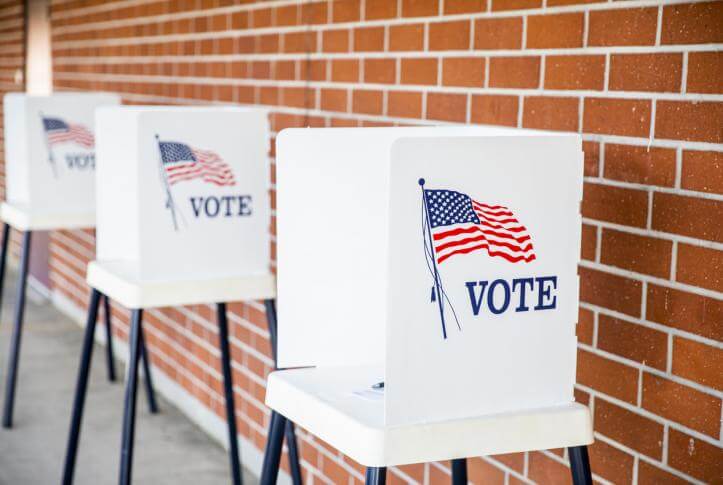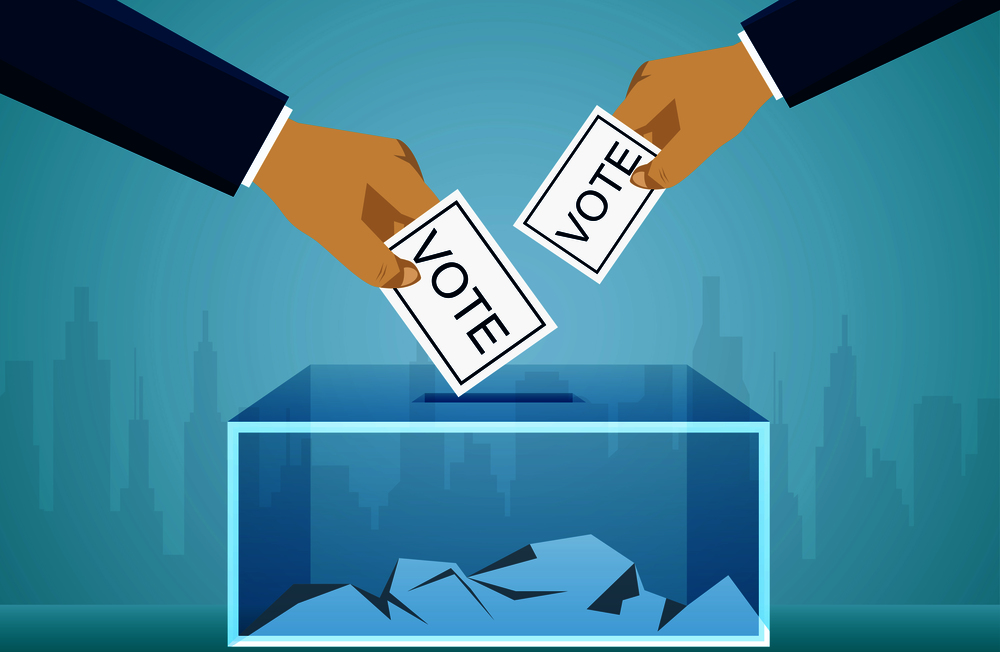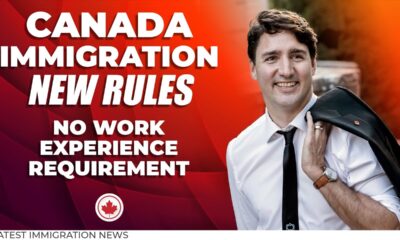Politics
6 Ideas You Can Steal from Election Results
Published
2 years agoon
By
admin
The 2016 U.S. presidential election was a long and difficult process. Millions of votes were counted, numerous debates were held, and countless ads were created—all in the hopes of electing the next president. And if you’re like most people, you probably tuned in to see who would win. Or at least, who you thought would win. Although the election is over, there are still plenty of lessons to be learned from it. In this article, we will explore six ideas that can help you improve your marketing campaigns and strategies in the future.
Take a step back and reflect on how you voted
If you’re still trying to make sense of the 2016 election results, take a step back and reflect on how you voted.
Perhaps the most important thing is to remember that your vote doesn’t determine who wins or loses – the electoral college does that. However, your individual vote can have an impact on which candidate is voted into office.
So what can you do to maximize your voting power? Here are five ideas to steal from election results:
1. Vote based on who you think will be the best candidate for the job, not just who you like or agree with.
2. Pay attention to campaign ads and Candidate websites. Don’t just vote based on what you hear from friends or family.
3. Vote early and often! Polls close at 8 p.m., but many states allow early voting starting several weeks before the election date.
4. Bring a backup ballot if you experience any problems with your original ballot at the polling place. This includes things like forgetting to sign your name in front of your ballot or having it rejected because it’s not marked in a specific way (like by a pen).
5. If there’s a presidential race that’s close between two candidates, don’t hesitate to switch your vote to whichever candidate you think will win in case one of those ballots isn’t counted properly (this has happened in past elections). Ultimately, though, it’s up to each individual state how their votes are tallied
Ask yourself what you want from politics
When it comes to voting, it’s important to take into account what you want from politics. Do you want a candidate who will represent your views and values, or do you want someone who will adhere to the party line? If you want someone who will represent your views and values, then you should vote for the candidate who best reflects your beliefs. Conversely, if you just want someone to toe the party line, then you should vote for the candidate who is most likely to win. In order to make an informed decision about who to vote for, it’s important to ask yourself what you want from politics.
Evaluate the candidates and their platforms
1. Hillary Clinton
Hillary Clinton is the Democratic nominee for president in the United States. She has been in public service for over 40 years, including as a lawyer and first lady of Arkansas. She ran for senator from New York in 2000 and was later elected to the Senate in 2008. She was secretary of state under President Barack Obama from 2009 to 2013. Her platform focuses on economic inequality, climate change, gun reform, and education reform.
2. Donald Trump
Donald J. Trump is the Republican nominee for president in the United States. He is a businessman and reality television personality who has never held public office before. He ran for president in 2015 and won with 39% of the vote. His platform focuses on border security, immigration reform, job creation, and stronger national defense.
Get involved in the democratic process
If you’re interested in getting more involved in the democratic process, here are some ideas to steal from election results.
1. Join a political party or campaign. This is a great way to learn about the different policies and candidates running for office, and it can also give you opportunities to volunteer your time.
2. Attend political rallies and events. Not only will this give you an opportunity to meet other activists and voters, but you’ll also get to see how politicians are campaigning on the ground.
3. Get registered to vote. This is essential if you want to have any influence over who wins elections – without registered voter participation, your vote will count less than those of other citizens.
4. Educate yourself about voting rights and electoral issues. Familiarize yourself with the different voting laws in your state, as well as the different ways that people can cast their ballots (e.g., mail-in ballots, early voting, etc.).
Vote!
If you’re looking to get a sneak peak of what could happen in this year’s presidential election, look no further than the results of last week’s primaries. Voters in five states chose nominees for both major political parties: Vermont Sen. Bernie Sanders for the Democratic Party, Ohio Gov. John Kasich for the Republican Party, Texas Sen. Ted Cruz for the Republican Party, and former Secretary of State Hillary Clinton for the Democratic Party.
While these nominations don’t represent who will ultimately win the general election, they do provide some clues about which ideas voters might favor.
Sanders won in four states with large populations of young people: Iowa, New Hampshire, Nevada and Maine. He also fared well with independents and moderate Republicans. In each of these states, he campaigned on policies like making college tuition free and raising taxes on the wealthy.
Kasich won in two Midwestern states – Ohio and Wisconsin – as well as his home state of Pennsylvania. He emphasized job creation and lowering taxes while criticizing President Obama’s Affordable Care Act. Kasich has also supported sending more troops to Iraq and Syria to fight ISIS.
Cruz won in his home state of Texas as well as Oklahoma and Utah. He focused on issues like repealing Obamacare and cutting government spending…
Take a moment to reflect on what you learned from the election
1. It’s important to stay informed!
2. Don’t be afraid to vote for your favorite candidate, even if they’re not your usual choice.
3. Make sure to get out and vote!
4. Get involved in your community – politics is a way of life!
5. Be vocal and raise awareness about the issues that matter to you.
Conclusion
Congratulations on making it through another election cycle! It has been an exciting journey watching the polls change week by week as we get closer and closer to the final results. While it is hard to pick a favorite candidate or party, there are plenty of lessons that can be learned from the election results. Here are six ideas that you can steal from this year’s election: 1. Vote in every single race – even if you don’t feel passionate about the candidates or think your vote will make any difference. Our democracy relies on all eligible voters participating, so don’t let your apathy keep you home on Election Day.
You may like
Politics
Unveiling the Dynamics: A Deep Dive into the 2023 Midterm Election Results
Published
1 year agoon
January 8, 2024By
admin
Introduction:
The 2023 Midterm Elections were a pivotal moment in the political landscape, shaping the trajectory of governance and providing insights into the sentiments of the electorate. As the dust settles and the results become clearer, it is imperative to undertake a comprehensive analysis of the outcomes, understanding the factors that influenced voter decisions, the shifts in political dynamics, and the implications for the future. In this detailed examination, we explore the key races, trends, and noteworthy developments that characterized the 2023 Midterm Election results.
1. National Overview:
- Control of Congress: The Midterm Elections traditionally serve as a referendum on the party in power, and the 2023 elections were no exception. With Democrats holding a slim majority in both the House of Representatives and the Senate, political pundits and citizens alike closely watched to see if the Republicans could make significant gains and potentially shift the balance of power.
- Historical Context: Midterm elections historically favor the party not holding the presidency, as voters often use this opportunity to express their satisfaction or discontent with the current administration. The outcome of these elections can impact the president’s ability to push forward their legislative agenda and set the tone for the remainder of their term.
2. Key Races and Battleground States:
- Senate Races:
- State A: In State A, a closely watched Senate race unfolded between the incumbent Democrat and a Republican challenger. The result had the potential to swing the balance of power in the Senate. The race saw intense campaigning, with both candidates addressing key issues such as healthcare, the economy, and climate change. In the end, the Republican candidate secured a narrow victory, contributing to the GOP’s efforts to regain control of the Senate.
- State B: Another critical Senate race took place in State B, where a well-known Democratic senator faced a formidable Republican opponent. This race garnered national attention due to its potential to shape the Senate’s ideological composition. The incumbent Democrat managed to hold onto their seat, providing a crucial win for the Democratic Party and maintaining their tenuous majority in the Senate.
- Governor Races:
- State C: Gubernatorial races are often indicative of state-level sentiments, and in State C, an incumbent Republican governor sought re-election against a Democratic challenger. The race was characterized by debates over education, infrastructure, and public safety. The Republican governor secured a decisive victory, highlighting the diverse political landscape at the state level.
- State D: A closely contested gubernatorial race unfolded in State D, where a Democratic contender aimed to unseat the Republican incumbent. The election centered on issues such as healthcare access, economic recovery, and environmental policies. In a surprising turn, the Democratic candidate emerged victorious, signaling a shift in gubernatorial dynamics and a win for the Democratic Party at the state level.
- House of Representatives Races:
- District X: One of the closely watched House races occurred in District X, where a freshman Democrat faced a spirited challenge from a Republican contender. The district, traditionally a swing district, became a microcosm of broader national trends. The Republican candidate secured a victory, contributing to the GOP’s efforts to narrow the Democratic majority in the House.
- District Y: In District Y, a longtime Republican stronghold, a Democratic candidate sought to capitalize on shifting demographics and changing political preferences. The race unfolded against the backdrop of debates on immigration, gun control, and economic policies. Despite a spirited effort from the Democratic candidate, the Republican incumbent retained the seat, showcasing the resilience of traditional political affiliations.
3. Influential Factors in Voter Decisions:
- Economic Concerns: Economic issues, ranging from inflation and job growth to pandemic recovery measures, played a significant role in shaping voter opinions. The perceived performance of the economy under the current administration influenced voters’ decisions, with both parties crafting narratives around their economic policies.
- Pandemic Response: The ongoing COVID-19 pandemic remained a focal point in the elections, with voters evaluating how different candidates and parties approached public health measures, vaccination campaigns, and pandemic-related economic support. The handling of the pandemic emerged as a critical factor in determining voter preferences.
- Social and Cultural Issues: Social and cultural issues, including debates on racial justice, LGBTQ+ rights, and immigration policies, resonated with voters. Candidates’ stances on these issues influenced voter alignment, and the election results reflected the complex interplay of values, ideologies, and societal shifts.
- Party Loyalty vs. Independents: The elections underscored the delicate balance between party loyalty and the influence of independent voters. While core party supporters tended to align with their respective candidates, independents played a pivotal role in determining outcomes, emphasizing the importance of candidates appealing to a broad spectrum of voters.
- Demographic Shifts: Changing demographics, both at the national and local levels, contributed to shifts in political dynamics. Understanding the evolving composition of the electorate, including generational changes and demographic diversity, became crucial for political strategists seeking to tailor their messaging to resonate with specific voter groups.
4. Noteworthy Trends and Patterns:
- Youth Voter Turnout: The level of youth voter turnout in the 2023 Midterm Elections drew attention, with efforts from various organizations and political movements aimed at mobilizing young voters. The results indicated that younger generations are increasingly becoming a force to be reckoned with in shaping electoral outcomes.
- Suburban Voting Patterns: Suburban areas continued to be a battleground, with voting patterns reflecting the diversity of perspectives within these communities. Suburban voters, often considered a swing demographic, demonstrated a willingness to reassess their political affiliations, making these regions crucial battlegrounds for both parties.
- Rural-Urban Divide: The rural-urban political divide persisted, with rural areas tending to lean more Republican and urban areas favoring Democrats. Understanding the nuances of these regional dynamics became essential for candidates seeking broad-based support.
- Impact of Redistricting: The results of the Midterm Elections were influenced by the impact of redistricting in several states. Changes in electoral boundaries and district configurations had repercussions on the competitiveness of races and, in some instances, favored one party over the other.
5. Implications for National Policy:
- Legislative Agenda: The outcomes of the Midterm Elections have significant implications for the legislative agenda of the winning party. A shift in control of the House or Senate can influence the feasibility of passing key legislation, affecting issues such as infrastructure investment, healthcare reform, and climate change initiatives.
- Confirmation of Appointments: The Senate’s role in confirming key appointments, including federal judges and members of the president’s cabinet, is crucial. The election results, particularly in the Senate, determine the ease or difficulty with which the president can advance their policy agenda through appointments.
- Executive-Legislative Relations: The balance of power between the executive and legislative branches shapes the dynamics of governance. If one party controls both chambers of Congress, they may have greater leverage in negotiating and shaping legislation, while a divided government may necessitate bipartisan cooperation to achieve policy goals.
- State-Level Impact: Gubernatorial races and state legislatures play a vital role in shaping policies at the state level. The outcomes of these races influence issues such as education, healthcare, and infrastructure development within individual states.
6. Voter Turnout and Civic Engagement:
- Voter Turnout Trends: Analyzing voter turnout trends provides insights into the level of civic engagement and the effectiveness of voter mobilization efforts. Understanding variations in turnout across demographic groups and regions helps identify areas for improvement in fostering widespread participation in the democratic process.
- Role of Grassroots Movements: Grassroots movements and community organizing initiatives played a significant role in mobilizing voters and shaping the narrative around key issues. The influence of grassroots activism highlights the importance of localized efforts in energizing voters and amplifying their voices.
- Barriers to Voting: Identifying and addressing barriers to voting remains a critical aspect of ensuring a fair and inclusive electoral process. Issues such as restrictive voting laws, accessibility challenges, and misinformation campaigns can impact voter turnout and undermine the democratic principles of free and fair elections.
7. Post-Election Reflections:
- Concession and Acceptance Speeches: The tone and content of concession and acceptance speeches by candidates offer a window into the post-election landscape. How candidates frame their messages in the aftermath of an election shapes public perception, sets the stage for future collaboration or opposition, and reflects the broader political climate.
- Post-Election Litigation: In some instances, post-election litigation may arise, challenging the results of specific races. The legal processes that follow elections contribute to the overall transparency and integrity of the electoral system, underscoring the importance of a robust legal framework for resolving disputes.
- Transition and Incoming Leadership: For races where there is a change in leadership, whether at the congressional, gubernatorial, or local level, the transition period is crucial. The incoming leaders must navigate the transition process effectively, assembling teams, and preparing to take on the responsibilities of governance.
8. International Perspectives and Reactions:
- Global Impact: The outcomes of U.S. elections are closely monitored on the international stage. Allies, adversaries, and international organizations assess the implications of election results for diplomatic relations, trade policies, and global governance. The international community’s response provides insights into the perceived stability and direction of U.S. domestic and foreign policy.
- Media Coverage and Analysis: How international media outlets cover and analyze the election results contributes to the global narrative surrounding U.S. politics. Different perspectives and interpretations from around the world offer a diverse range of insights into the implications of the elections on the global stage.
9. Looking Ahead: Anticipating Future Trends and Challenges:
- Long-Term Political Shifts: The Midterm Elections serve as a barometer for long-term political shifts and trends. Analyzing demographic changes, evolving voter preferences, and the resonance of political messaging provides a foundation for anticipating the future direction of American politics.
- Technology and Elections: The role of technology in elections continues to evolve, influencing voter outreach, campaign strategies, and even the nature of political discourse. As technology becomes more ingrained in the electoral process, considerations related to cybersecurity, misinformation, and the ethical use of data will remain at the forefront of electoral discussions.
- Social and Cultural Transformations: Social and cultural transformations, including changes in societal attitudes towards diversity, equity, and inclusion, contribute to shifts in political dynamics. Political parties and candidates must navigate these transformations to remain relevant and responsive to the evolving needs and expectations of the electorate.
- Election Integrity and Reforms: Maintaining and enhancing election integrity is an ongoing challenge. Addressing concerns related to voter suppression, gerrymandering, and the influence of money in politics requires sustained efforts to enact meaningful reforms that strengthen the democratic process.
Conclusion:
The 2023 Midterm Election results offer a comprehensive snapshot of the state of American politics, reflecting the sentiments, priorities, and aspirations of the electorate. From closely contested races to broader trends shaping the political landscape, the outcomes provide valuable insights into the dynamics of democracy in action. As the nation navigates the post-election landscape, the implications of these results will reverberate across legislative chambers, executive offices, and the myriad communities that constitute the American electorate. The intricate tapestry of the 2023 Midterm Elections invites ongoing reflection, analysis, and a forward-looking approach to addressing the challenges and opportunities that lie ahead in the democratic journey.
Politics
Peter Obi Net Worth: Make Money from Business and politics & More
Published
1 year agoon
November 6, 2023By
admin
Peter Obi is a renowned figure in Nigeria known for his success in both the business and political arenas. This article delves into his net worth, his journey through business and politics, and how you can draw inspiration from his accomplishments to enhance your own financial prospects.
Early Life and Education
Peter Obi was born on July 19, 1961, in Onitsha, Anambra State, Nigeria. He completed his primary and secondary education in Nigeria and later pursued a Bachelor of Arts in Philosophy from the University of Nigeria, Nsukka. His educational background laid a strong foundation for his future endeavors.
Entry into Business
After completing his education, Peter Obi ventured into business. He began with a modest capital and gradually expanded his business interests. His commitment, vision, and entrepreneurial acumen played pivotal roles in his journey to success.
Political Career
Peter Obi’s foray into politics began when he was elected as the Governor of Anambra State in Nigeria in 2006. He served two terms and is widely recognized for his achievements during his tenure. His political career has been intertwined with his business acumen, making him a unique and influential figure in Nigerian politics.
Achievements in Business
Peter Obi has been successful in various business sectors, including banking, manufacturing, and real estate. He founded several companies, and his dedication to innovation and excellence has been instrumental in his accomplishments. His business ventures have contributed significantly to his overall net worth.
Political Milestones
As a political leader, Peter Obi implemented numerous development projects in Anambra State. His administration focused on improving infrastructure, healthcare, and education. His dedication to public service and governance led to several accolades.
Philanthropy and Social Work
Peter Obi is also known for his philanthropic efforts and social work. He has supported numerous charitable causes and has made substantial donations to educational institutions. His commitment to giving back to the community showcases his compassionate side.
Controversies
Like many public figures, Peter Obi has faced controversies during his career. These have ranged from political disputes to financial matters. However, his resilience and ability to navigate through challenges have solidified his reputation as a determined leader.
Net Worth
Peter Obi’s net worth is estimated to be in the range of $200 million to $300 million. His diverse investments and assets contribute to this substantial net worth, making him one of Nigeria’s wealthiest individuals.
How Peter Obi Makes Money from Business
Peter Obi’s business success is driven by his investments in various sectors, including banking, manufacturing, and real estate. He maintains a diverse portfolio, ensuring a steady stream of income from his business ventures.
How Peter Obi Makes Money from Politics
In politics, Peter Obi has earned through various avenues, including his salary as the Governor of Anambra State, political appointments, and the influence he wields in policy-making. His political journey has opened up opportunities for financial growth.
Investment Strategies
Peter Obi’s investment strategies include diversification, risk management, and a keen understanding of market trends. His ability to adapt and make informed decisions has been crucial in growing his wealth.
Lessons from Peter Obi’s Success
- Education is a strong foundation for success.
- Diversify your investments to reduce risk.
- Combine business and politics strategically for a comprehensive financial approach.
- Give back to the community through philanthropy and social work.
Conclusion
Peter Obi’s journey from business to politics has been marked by success, controversies, and philanthropy. His net worth is a testament to his hard work, dedication, and ability to navigate the complexities of both fields. As you consider your own financial aspirations, remember the valuable lessons you can draw from his life.
FAQs
- What is Peter Obi’s primary source of income?
- Peter Obi’s primary sources of income are his diverse business investments and political career.
- How did Peter Obi achieve success in politics and business simultaneously?
- Peter Obi strategically combined his business acumen with his political career, creating a unique path to success.
- What is Peter Obi’s approach to philanthropy?
- Peter Obi is known for his philanthropic efforts and believes in giving back to the community through charitable donations and support for education.
- What are some of the controversies Peter Obi has faced in his career?
- Peter Obi has faced controversies ranging from political disputes to financial matters, but his resilience has helped him overcome them.
- What lessons can we learn from Peter Obi’s success?
- We can learn the importance of education, diversification, strategic combination of business and politics, and giving back to the community through philanthropy from Peter Obi’s success.
This article provides valuable insights into the life and financial success of Peter Obi, a figure whose journey through business and politics has inspired many. By understanding his strategies and principles, you can enhance your own financial prospects and make the most of your opportunities.
Business
How to Negotiate Your Compensation Claim Settlement
Published
2 years agoon
May 25, 2023By
danielclarke
If a third party’s negligence causes severe injuries at a construction site or road accident, you can demand compensation. You should pay the compensation claim through legal processes. The settlement of the compensation claim will recover the bills for medical and rehabilitation centres as well as medication costs.
You should hire an efficient lawyer in the process of receiving TPD claims in Brisbane. The insurance companies try to bluff clients and only inform them about a few other benefits that can be received. Lawyers have complete knowledge of the laws and ways to get maximum compensation.
Besides, lawyers also have excellent negotiating skills to negotiate your compensation claim settlement. In this article, you will learn the importance of negotiating with insurance companies.
-
Know your worth
Insurance companies want to earn a profit and to prevent that loss, they try to settle their clients at low compensation. They offer a take-it-or-leave-it settlement for their injury. It is insufficient to cover the total cost of your medical treatment, rehabilitation centre, and medicines.
The settlement demand should be set over two amounts as the minimum value decided for your compensation.
- The range is that you know the claim is worth or indicated in your settlement demand.
- The minimum range that can be accepted.
The minimum settlement range can be adjusted afterwards, but numerous factors can strengthen or weaken your claim. You should know the minimum settlement or bottom line of your compensation claim amount. It is an excellent step to secure the largest settlement agreement from an insurance company.
-
Lowball offers should be avoided
Insurance companies tend to use tactics against innocent clients. The insurer tends to settle your claim at a low cost, and once you accept, you will be in trouble. You should assess the minimum value of your settlement before applying for the superannuation claims.
When the insurer makes a lowball settlement, you should avoid it and not accept it. Ask the insurer to provide valid reasons for the low settlement of the compensation claim. You should appoint a TPD lawyer to address concerns clearly and negotiate the settlement amount. The lawyer highlights every single point mentioned in the policy with detailed analysis and provides solid answers to the questions put up by the insurer.
-
Justify your claim
Before making any claim in personal injury or TPD claims, you should have sufficient proof of your claims. You should prepare a documented file of the tangible injuries and the damage caused to your life quality, present and future earning losses, and medical treatment expenses. All the documents will be helpful in the successful negotiation of settlement claims.
You should pay attention to documenting each cost incurred from the time of the accident till the date. Provide this as accurate proof or evidence of the injury treatment. It includes all the expenses and receipts of medical costs, prescription bottles, paycheck stubs, and damage to non-quantifiable assets.
-
Know the time limit for taking legal action
The injury or TPD claims should be made before the deadline, which is called a statute of limitations. It is important to know the time limit for making such claims after the accident.
If you claim after that specified time, Your claim will be denied, and you will not receive the benefits from that claim to recover any financial damage. Consult about the issue with the lawyer to understand the statute of limitations.
You should quickly collect all the required evidence and put your case together soon after the accident. Do not wait for long to recover compensation costs from the third party. Take photos of the incident, contact information, and police involvement, and negotiate a settlement for maximum compensation to recover your expenses.
-
Involvement of a lawyer during the process
A lawyer is always beneficial in such cases to get the maximum compensation settlement. You should hire a lawyer with expertise in handling insurance cases. They should be experienced with proper credentials and skills. A lawyer with clear goals and knowledge of their area of interest will help you recover the amount you deserve.
All the points mentioned above are useful for successful negotiation with the insurance company.
Conclusion
You should be careful while applying for the TPD super claim, as you will get a larger settlement amount in these cases. Seek legal advice before using for maximum benefits of the TPD insurance before an accident. Lawyers know the alternate solution to every problem, and seeking advice from them will be beneficial.
Also Read:- Why You Should Hire Slip and Fall Injury Lawyer

What is Cardano? Everything you need to know
Ahegao – An In-Depth Look at the Popular Cultural Phenomenon

Photeeq Lens Flare: Master Stunning Effects for Your Photos

Get your Canadian visa in a jiffy – Hong Kong citizens can now apply online!
BiharMasti: The Place to Download Bhojpuri Movies and Music

How do MEP Services help contractors?
Trending
-

 Business2 years ago
Business2 years agoGet your Canadian visa in a jiffy – Hong Kong citizens can now apply online!
-

 Tips & Tricks2 years ago
Tips & Tricks2 years agoBiharMasti: The Place to Download Bhojpuri Movies and Music
-

 Business2 years ago
Business2 years agoHow do MEP Services help contractors?
-

 Law2 years ago
Law2 years agoWhat states have no chase law for motorcycles
-

 Business2 years ago
Business2 years agoEverything You Need to Know About SQM Club
-

 Technology2 years ago
Technology2 years agoHow to do Jio Prepaid Recharge Online
-

 Game1 year ago
Game1 year agoOvertime Megan Leaks: Understanding the Controversy
-

 Business2 years ago
Business2 years agoHow to Negotiate Your Compensation Claim Settlement

